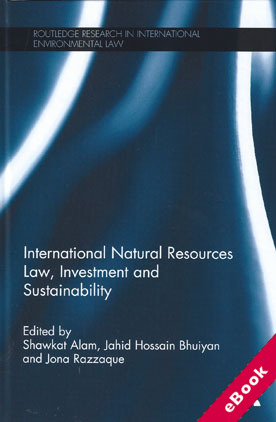
The device(s) you use to access the eBook content must be authorized with an Adobe ID before you download the product otherwise it will fail to register correctly.
For further information see https://www.wildy.com/ebook-formats
Once the order is confirmed an automated e-mail will be sent to you to allow you to download the eBook.
All eBooks are supplied firm sale and cannot be returned. If you believe there is a fault with your eBook then contact us on ebooks@wildy.com and we will help in resolving the issue. This does not affect your statutory rights.
The question of appropriate use of natural resources inevitably raises competing interests between the resource rich and resource hungry nations.
Such conflict of interests is not new; this is evidenced in the way BRIC countries' investment in the natural resource sector in Africa has attracted international attention and debate. This investment shows that while export of natural resources can drive economic growth, unsustainable extraction can lead to increased poverty and conflict. The law of natural resources denote these conflicts of interest by gauging careful management of resources to avoid waste, environmental pollution and conflicts.
The shift of economic power toward developing countries such as Brazil, India, China, South Africa, along with growing south-south cooperation, has given impetus to reassess the legitimacy and efficacy of the international regulation of natural resources and whether this balance between interests has been sufficiently achieved.
This book provides a background of the law governing natural resources and explores the relationship with key concepts such as sustainable development, sovereign rights, and state responsibility principles within international law. It will examine the existing legal structures for conserving, preserving, using and extracting natural resources at an international level along with an up-to-date overview of the inter-linkage between investment and international natural resources law.
Examples from energy, nuclear energy, renewable energy, oil and gas, fisheries, coastal resources, mineral, and wildlife will be assessed. It will also explore the contribution of non-state actors as well as the responsibility of key players including the World Bank and private multinational companies in the utilisation and conservation of natural resources.
Natural Resources Law, Investment and Sustainability will be of great interest to students and scholars of international environmental law, international human rights law, investment law and international economic law. This book may also be of relevance to environmentalists, policy-makers, NGOs, and investors working in the natural resources field.